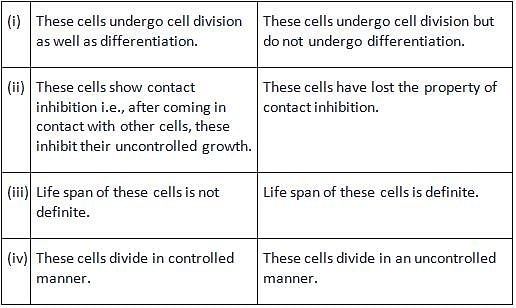Test: Cancer (January 6) - NEET MCQ
10 Questions MCQ Test - Test: Cancer (January 6)
Read the following statements and select the correct option.
Statement 1: Malignant tumors normally remain confined to their original location, do not spread to other body parts and cause less damage.
Statement 2: Cancer arising from epithelial tissues of internal organs and glands is referred to as sarcoma e.g., breast cancer, cervical cancer etc.
Statement 2: Cancer arising from epithelial tissues of internal organs and glands is referred to as sarcoma e.g., breast cancer, cervical cancer etc.
Several genes called _____have been identified in normal cells which when activated will turn in to ___ , and under certain conditions, could lead to cancerous transformation of the cells.
Complete the above paragraph by selecting correct sequence of words.
| 1 Crore+ students have signed up on EduRev. Have you? Download the App |
Read the following statements carefully.
(i) Cancer causing viruses have genes called viral oncogenes.
(ii) Malignant tumors remain confined to their original location.
(iii) Cancer cells do not exhibit contact inhibition.
(iv) X-rays and UV rays are not potent carcinogens.
(v) Cancer detection is based on biopsy.
Which of the above statements are not correct regarding cancer?
The substance given to cancer patients in order to activate their immune system and destroy the tumour is
Match column I with column II and select the correct option from codes given below.

Following table summarises the differences between normal cells and cancerous cells. Pick up the wrong difference(s) and select the correct option.

A metastatic cancerous tumour is termed 'sarcoma' if the disorder is in

















